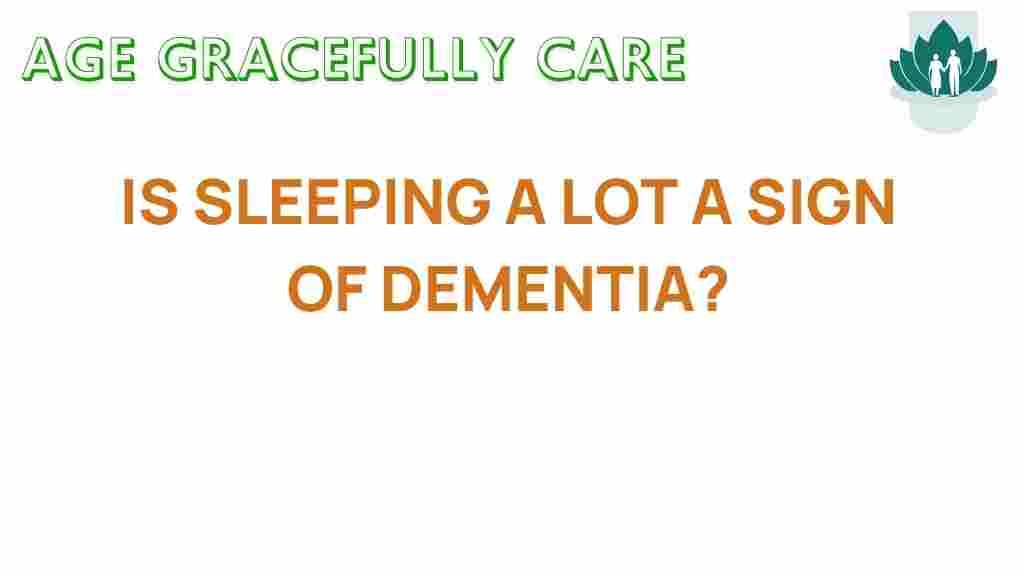Is Excessive Sleeping a Hidden Indicator of Dementia?
As we age, our bodies undergo numerous changes, and sleep patterns can be one of the most noticeable. While many people believe that sleeping more is simply a sign of aging or fatigue, excessive sleeping could potentially be a hidden indicator of more serious issues, including dementia. Understanding the relationship between cognitive health and sleep can help us identify early signs of mental decline and act proactively. In this article, we will explore the connection between excessive sleeping and dementia, how to recognize these signs, and what steps can be taken to support brain health.
The Link Between Sleep and Dementia
Research has shown that there is a significant relationship between sleep and neurological disorders. Quality sleep is crucial for maintaining brain health, and disruptions in sleep patterns can contribute to cognitive decline. Here are some key insights into this connection:
- Sleep and Memory: Sleep plays a vital role in memory consolidation. The brain processes and stores information during sleep, and insufficient sleep can lead to memory loss.
- Impact of Sleep Disorders: Conditions such as sleep apnea, insomnia, and restless leg syndrome can disrupt sleep, leading to problems with attention, learning, and memory.
- Excessive Sleeping: While not as widely discussed, excessive sleeping may also impact cognitive functions and could be an early sign of dementia.
Understanding Excessive Sleeping
Excessive sleeping, medically known as hypersomnia, is defined as sleeping more than the typical amount, which is generally considered to be 7-9 hours per night for adults. Here are some potential causes of excessive sleeping:
- Medical Conditions: Certain medical issues, including sleep apnea, depression, and chronic fatigue syndrome, can lead to prolonged sleep.
- Medications: Some medications may have side effects that cause increased drowsiness or sleepiness.
- Lifestyle Factors: Poor sleep hygiene, lack of physical activity, and unhealthy diets can also contribute to excessive sleeping.
Recognizing Early Signs of Dementia
Identifying early signs of dementia can be challenging, as symptoms often develop gradually. However, some common indicators include:
- Memory Loss: Difficulty remembering recent events or conversations can be an early warning sign.
- Disorientation: Getting lost in familiar places or forgetting the date and time.
- Changes in Sleep Patterns: Not just excessive sleeping, but also insomnia or changes in the ability to fall or stay asleep.
- Difficulty with Problem-Solving: Struggling to follow a recipe or manage finances can indicate cognitive decline.
The Role of Sleep Patterns in Cognitive Health
Sleep patterns can significantly influence cognitive health. Here are some ways in which sleep affects brain function:
- Deep Sleep and Brain Repair: During deep sleep, the brain clears toxins that accumulate during the day, which is essential for maintaining cognitive function.
- REM Sleep and Emotional Health: REM sleep supports emotional regulation and memory processing, which are critical for overall mental health.
- Sleep and Neuroplasticity: Quality sleep promotes neuroplasticity, the brain’s ability to reorganize itself, which is vital for learning and memory.
Step-by-Step: How to Monitor Sleep and Cognitive Health
Monitoring sleep and cognitive health is crucial, especially for older adults. Here’s a step-by-step guide:
- Keep a Sleep Diary: Record sleep duration, quality, and any disturbances. This can help identify patterns or issues.
- Monitor Cognitive Function: Pay attention to memory lapses, confusion, and other cognitive changes. Tools like memory tests or cognitive assessments can be useful.
- Consult a Healthcare Professional: If excessive sleeping or cognitive decline is observed, it’s essential to consult a physician for evaluation and possible testing.
- Adjust Lifestyle Habits: Improve sleep hygiene by maintaining a consistent sleep schedule, creating a restful environment, and reducing caffeine and screen time before bed.
Troubleshooting Tips for Better Sleep and Cognitive Health
If you or a loved one is experiencing excessive sleeping or cognitive decline, consider the following troubleshooting tips:
- Establish a Routine: Going to bed and waking up at the same time each day can help regulate sleep patterns.
- Create a Sleep-Friendly Environment: Keep the bedroom dark, cool, and quiet to promote better sleep quality.
- Engage in Regular Physical Activity: Exercise can improve sleep quality and overall cognitive function.
- Limit Naps: While napping can be beneficial, excessive daytime napping may disrupt nighttime sleep.
- Stay Mentally Active: Engage in activities that stimulate the brain, such as puzzles, reading, or learning new skills.
The Importance of Brain Health
Maintaining brain health is crucial as we age. Here are some strategies to support cognitive health and potentially reduce the risk of dementia:
- Healthy Diet: A balanced diet rich in antioxidants, healthy fats, and vitamins can support brain health. Consider the Mediterranean diet, which has been linked to lower dementia risk.
- Social Engagement: Staying socially active can enhance mental health and cognitive function.
- Manage Stress: Chronic stress can negatively affect cognitive health. Techniques such as meditation, yoga, or deep breathing exercises can be beneficial.
- Avoid Smoking and Limit Alcohol: Both smoking and excessive alcohol consumption can increase the risk of cognitive decline.
For more information on maintaining brain health, check out this external resource: Alzheimer’s Association.
Conclusion
Excessive sleeping can be a hidden indicator of dementia and other cognitive health issues. By understanding the relationship between sleep patterns and cognitive function, individuals can be better equipped to recognize early signs of mental decline. Monitoring sleep and cognitive health is essential, and making lifestyle changes can significantly impact overall brain health. If you notice excessive sleeping or other signs of cognitive decline, consult a healthcare professional for guidance and support.
Remember, taking proactive steps towards improving sleep and cognitive health can help mitigate the risks associated with neurological disorders and enhance overall quality of life.
For more information on strategies to support cognitive health, visit our internal resource: Cognitive Health Strategies.
This article is in the category Health and created by AgeGracefullyCare Team
